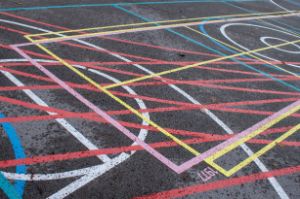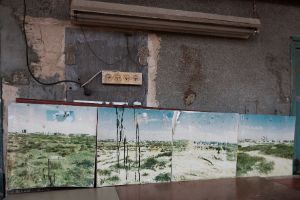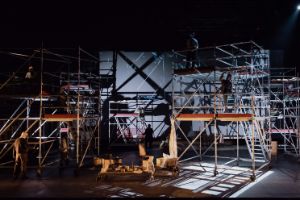
Theatre
House
By Amos Gitai
La Colline – théâtre national
German premiere

House © La Colline – théâtre national
“House” is an adaptation of the documentary film trilogy of the same name (1980, 1998 and 2005), in which Israeli director Amos Gitai portrayed a house in West Jerusalem and its residents over several decades.
The house was initially owned by a Palestinian doctor who was forced to leave it when he fled the war that followed the founding of the Israeli state in 1948. It was then appropriated by the Israeli state and handed over to its future residents, Jewish immigrants from Colomb Bechar (Algeria) and subsequently an Israeli economist who decided to convert the single-storey house into a multi-storey villa, recruiting Palestinian workers from the refugee camps near Yatta, in the West Bank. In the different stories told by the current and former residents and the craftsmen who worked on renovating the house, a multi-layered web of perspectives and memories develops that traces the lines of the Middle East conflict through their individual biographies.
For the play “House”, Amos Gitai revisits the beginnings of his film work and translates the documentary films for the theatre stage. The debate has lost none of its relevance today.
Please be mindful of our code of conduct for freedom of expression and respectful exchange.
Multilingual ensemble
Actors and musicians with roots in the Middle East, Iran and France perform together on stage. Music is heard from a variety of cultural traditions along with numerous different languages: Arabic, Yiddish, French, Hebrew, English, Armenian and Turkish. Through the composition of its multilingual ensemble, “House” attempts to establish a dialogue that presents Israeli and Palestinian narratives side by side on equal terms. With the restrained gesture of an attentive observer, Amos Gitai juxtaposes contrasting memories and perceptions: relief at the establishment of a Jewish state as a promise of security and despair at the expulsion of Palestinians from their homeland both have their place.
The filmmaker as archaeologist
The trained architect Amos Gitai (born in Haifa in 1950) made his first film experiments with a Super 8 camera during his deployment in the Yom Kippur War (1973), where he survived a Syrian missile attack on the evacuation helicopter he was sitting in. The first part of the “House” trilogy (Bait, 1980) was commissioned by Israeli television, but was censored and not broadcast. He then moved to Paris to continue his cinematic work. He later returned to this house and the people associated with it, and shot two further episodes. The internationally renowned and award-winning director now lives in Paris and Israel and has created over 90 documentaries and feature films. In recent years, Amos Gitai has also worked as a theatre director, at venues including the Théâtre de la Ville in Paris, the Spoleto Festival in Charleston, USA, the Coronet Theater in London, the Odéon - Théâtre de l’Europe in Paris and the Burgtheater in Vienna. In many of his works, Gitai examines the contradictions of his Israeli homeland. Here he compares his working practice to that of an archaeologist, painstakingly unearthing one layer after another in order to discover the complexities that underlie the present.
Artistic Team
Amos Gitai – Director, Text and Stage Design
Marie-José Sanselme, Rivka Gitai – Text Adaptation
Marie La Rocca – Costume Design
Jean Kalman – Lighting Design
Éric Neveux – Sound Design
Richard Wilberforce – Musical Direction
Laurent Truchot – Video Collaboration
With
Irène Jacob, Bahira Ablassi, Micha Lescot, Minas Qarawany, Atallah Tannous, Pini Mittelman, Menashe Noy
Alexey Kochetkov, Kioomars Musayyebi – musicians
Dima Bawab – soprano












